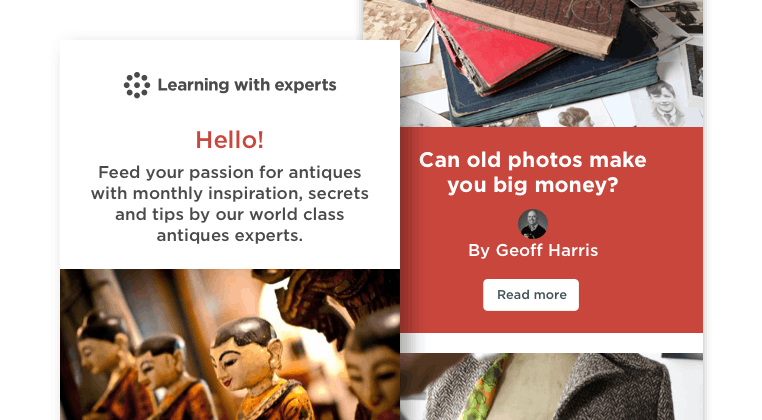Five tips for starting an antiques collection
By Geoff Harris •
Taking the plunge and starting off an antiques collection from scratch can be scary, but do your research and follow these common-sense rules, and it can be a lot of fun – as well as potentially profitable
Decide what you want to collect
The first starting point is to decide what kind of antiques you are interested in, and go from there. For antiques, we mean anything over 100 years old; anything newer may be classed as ‘vintage’ though the demarcation lines are not that strict. What does matter, however, is to be clear about what you want to collect. China? Jewellery? Militia? Clocks? Furniture? There is a very wide choice. If you are torn, think about what tends to attract you first at antiques fairs or flea markets, or what gets your attention on Antiques Roadshow.
Get educated
The antiques market, like any other, is full of potential pitfalls for the unwary so once you have decided what you want to collect, learn as much about the subject as you can. You can access some excellent introductory courses via Learning With Experts, hosted by luminaries such as Marc Allum (Antiques Roadshow again).
Recommended course
Collecting Antiques
Marc Allum
Collecting Antiques taught by Marc Allum
Learn how to invest wisely in arts, antiques and collectables to build a well-balanced portfolio.
View courseAll Antiques coursesMarc’s course will also cover buying art and antiques for investment, so it can save you a lot of money and angst. The antiques market is affected by trends and fashions, as anyone trying to sell 1930s heavy brown furniture will tell you, so Marc gives some valuable pointers on this. Courses aside, there is bound to be an Internet forum or social media feed dedicated to your area of interest, and these can be an invaluable source of information and cautionary tales.
Know where to start
Antiques market, flea markets and even car boot sales are a great place to start; prices are often lower than you’ll find in a dedicated antiques shop (these have business rates, staff to pay and other overheads) and sellers are usually ready to do a deal. You may be lucky and pick up a Chinese vase for a song that is worth thousands, but even if not, these events are a great place to sharpen your eye and get to know dealers. Strike up a relationship with a dealer, and they may give you first dibs on an interesting item that comes onto their books next time. Or they might recognise you at the next event and give you a bit more of a discount. The beauty of a flea market is even if you end up paying for a dud, you’ve hopefully not spent too much – as with anything else, you need to open to learning from your mistakes.
Learn how to spot fakes
This is a very big subject, but here are a few pointers – many of which are common sense. If somebody is claiming to sell a Victorian item that contains cross-head screws/Allen bolts, coloured plastic or other 20thcentury materials, the alarm bells should start ringing. Become sensitive to how patina and wear develop over time, and if it looks like the patina has been added artificially, it’s another big warning sign. Excessively clean antique items should also be viewed with scepticism, as should anything that looks like it has been upcycled!
Recommended course
Upcycling Furniture
Juliette Goggin
Upcycling Furniture taught by Juliette Goggin
Learn how to upcycle a chest of drawers, recover a seat, make vintage cushions and more.
View courseAll Antiques coursesThe smell of old wood and paper is another clue; start to worry if all you can smell is furniture polish. If buying china or precious metal, learning about the maker’s marks is also crucial. Check the labels on items of clothing too. I remember seeing an ‘authentic vintage Japanese yukata’ (bath robe) on sale for a premium price, but a closer inspection revealed it was made in China.
We’re not saying you need to learn Japanese or Mandarin, but learning to recognise a few important characters can save you money.
Be sceptical about mass produced items which are traditionally aimed at tourists; an ‘antique brass Buddha’ may have actually come from a tacky market in Thailand or Nepal. If the seller starts waffling when you ask them about provenance, or is unable to provide any evidence, walk away (or if it still catches your eye, barter them down to a much more sensible price). That said, don’t miss out on a potential bargain – this Buddha, bought from £30 from a car boot sale in Liverpool, was worth thousands!
Start with online auctions
Auctions can be intimidating for the uninitiated, and if you have travelled some distance to get there, you may feel you should at least buysomething– and it might not always be the best choice, or within your budget. Online auctions, particularly those from reputable sites such as loveantiques.com or sellingantiues.co.uk are a great place to start.
You can take your time and it’s not in the interest of a big ‘portal’ site to feature dodgy dealers.
Finally, have fun. Don’t get too excited if you bag a bargain and suddenly think you’re the next Marc Allum; pride comes before a fall. Conversely, don’t beat yourself up if you do end up paying over the odds for something that isn’t as old as it seems. While we’d hate you to lose your shirt – and there is no reason to if you follow a reputable online course and research your area of interest – it’s absolutely fine to make the odd mistake, so long as you learn from it.
Stay updated
Receive free updates by email including special offers and new courses.
